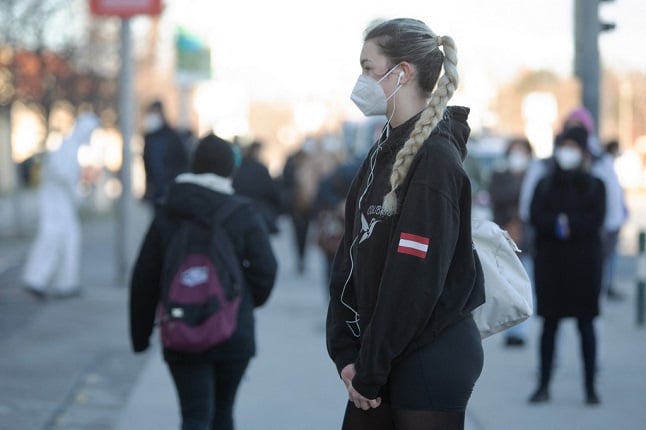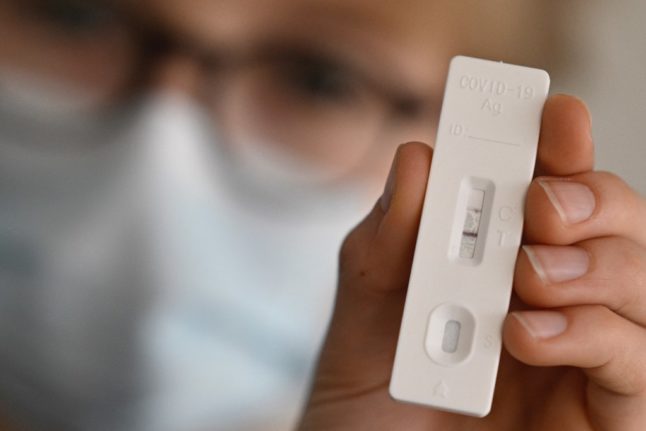The pandemic is not over, as we repeatedly hear the Austrian authorities saying. The news that sub-variants of the coronavirus have been found in the country has led to some concern.
Here is what we know so far about the pandemic situation in Austria.
New variants BA.4 and BA.5 in Austria
Austrian media reported that the new Covid-19 sub-variants known as BA.4 and BA.5 have been detected for the first time in the country.
The city of Vienna has reported its first cases to the Ministry of Health, and some individual cases were also identified in Styria and Salzburg.
READ ALSO: UPDATED: The latest coronavirus restrictions in Austria
Health Minister Johannes Rauch (Greens) said that the omicron sub-variants provide slightly more infections than the currently dominant variant BA.2. There is a suspicion that they could be better at avoiding the body’s current antibody defences against Covid-19.
However, this is viewed as a sign that the current downward trend seen in the number of infections could slow down, but not that it would stop or that the infection rate would go up again.
There is also no indication so far that the variants first identified in South Africa create a more severe disease course.
Should we be concerned?
Not according to specialists. Health authorities in Austria are “monitoring the situation very closely, but it doesn’t worry us at the moment”, Mario Dujakovic, spokesman for the Vienna Health City Councillor, said.
READ ALSO: Five possible winter scenarios for Covid-19 in Austria
“There is currently nothing to suggest that we should be concerned, but it certainly makes sense to keep a close eye on things. So we will continue to do this: monitor the situation closely and decide together with experts what to do if the worst comes to the worst. “, he said.
He also shared a graph showing that wastewater analyses all over Austria have come back with less viral material – a sign that the virus is less prevalent overall, new mutations or not.
Die Positivitätsrate in Wien ist weiter im Abklingen: Im Schnitt bei 1,44% der letzten 8 Tage und vorerst weiter sinkend – bei rund 127.000 PCR-Tests pro Tag. Die Abwasseranalysen zeigen auch: Es ist weniger Virenmaterial im Abwasser in ganz Österreich. #CoronavirusAt #wien pic.twitter.com/eHFcAVEBlu
— Mario Dujaković (@mariodujakovic) May 3, 2022
Mask obligation to stay at least until July 8th
Austria currently has very few coronavirus restrictions in place. However, there are 3G (vaccinated, recovered, or tested) rules for entry in the country, some measures for visitation to hospitals and care units, and, most generally felt by the broader population, a mask mandate in some indoor areas.
READ ALSO: Austria to keep masks only in ‘essential places’ from April 16th
Those who visit or work in essential trade, such as supermarkets and pharmacies, still have to wear FFP2 masks in these establishments. In addition, the mask mandate is still in place for hospitals, care homes, public transport and their stops, taxis, and government authorities, among a few others.
These requirements have been criticised, as The Local reported. The Austrian Chamber of Commerce called for an end to the requirement and complained about the “unfair” restriction, which falls only to those dealing with essential trade.
Since April 16th, the federal government has lifted the mask requirements for most indoor areas, including non-essential trade.
READ ALSO: Austria extends Covid regulations as experts warn of an autumn resurgence
However, Health Minister Johannes Rauch has already rejected the demand, at least for the time being. The minister said that the uniform regulations, including the FFP2 mask obligation, should stay in place at least until July 8th.
He mentioned that it is important to be “vigilant”, especially concerning the newly emerging omicron variants and possible development.
Numbers are falling but expected to stabilise
Austria this Thursday reported 5,755 new infections after 157,301 PCR-Tests, according to the Health Ministry.
There are currently 1,077 people hospitalised with Covid-19, 34 fewer than in the previous 24 hours. Additionally, 84 people are in intensive care units due to the disease.
READ ALSO: Austria recommends Covid booster shot for children aged five and over
The alpine country has recorded 18,222 deaths since the beginning of the pandemic, 22 in the last 24 hours.
Just about 68 per cent of the population has a valid vaccination certificate for Covid-19 vaccines, and 54.9 per cent have had their booster shot.
The Ministry expects that soon the number of cases in Austria will stop falling and gradually reach a stabilisation period, Der Standard reported. Also, in a few days, less than 1,000 corona-infected people would need intensive care or regular beds because of the disease.



 Please whitelist us to continue reading.
Please whitelist us to continue reading.
Member comments